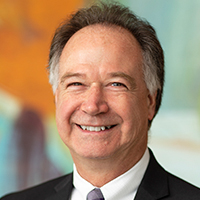
We plan for clients to live to age 95 unless they have a family history of short lives or have received a diagnosis that their health is comprised. I love it when my clients have the resources to retire in their preferred style, but that’s not all we need to plan for: I also encourage clients to be active. Although there is nothing wrong with playing golf or watching a little TV, 30 or 40 years is a long time to play golf or watch television all day.
I do not consider a retirement successful unless it is fulfilling psychologically and emotionally as well as financially. Neither do psychologists and gerontologists.
Ken Dychtwald, Ph.D., psychologist/gerontologist and founder and CEO of Age Wave said, “Research has shown that having a sense of purpose can actually reduce the risk of cognitive decline, cardiovascular disease and depression, so finding meaning in one’s life is essential to a long, healthy and potentially fulfilling retirement.”
Age Wave recently teamed up with Edward Jones to study well-being in retirement. One of the biggest insights they found in their study, “The Four Pillars of the New Retirement: What a Difference a Year Makes,” which was fielded during the pandemic and published in June 2021, is that “the majority of retirees say that all four interdependent pillars — health, family, purpose and finances—are essential to achieve optimal well-being in retirement.”
In addition, “retirees, when compared to younger Americans, are far more likely to say that ‘having a sense of purpose’ in life is necessary to achieve optimal well-being (69% vs. 55%),” the study said.
“I do not consider a retirement successful unless it is fulfilling psychologically and emotionally as well as financially.”
A Reason to Get Up in the Morning
Feeling that your life has meaning is also helpful while you are working but, for some, the need is more intense after they no longer have the identity provided by their job. A successful retirement requires finding the retiree’s purpose. . As Dychtwald says, “Finding meaning in one’s life is essential to a long, healthy and potentially fulfilling retirement.” What creates purpose and joy for one client may not have any meaning for another.
Purpose, meaning, identity, fulfillment are all variations on a theme. People need a reason to get up in the morning. Some people lose this identity when they leave their job and need some help finding a new identity.
As their advisor, you may be able to provide support, encouragement and guidance to your client. You can help your clients find their purpose through values identification and meaningful conversations. The first step is to understand how retirees successfully meet these needs. There is a lot of success to study, 63% of retirees responding to the “Four Pillars of the New Retirement” survey believe they spend their time in purposeful ways.
Clients use a wide variety of activities to provide purpose or identity. Those activities may be for pay or not. They may be as a volunteer or as a hobby. They may continue some aspect of the client’s lifelong work or it may be an entirely new direction. Your client may be very good at finding new activities because they were self-directed in their work, or they may be the opposite and took direction their entire life and now want to do “whatever they want.”
Part-Time Work and Hobbies
Of course, the client’s circumstances may dictate their options. Some clients may need part-time work to pay the bills or they may be concerned that the work they are doing is not valued if they are not getting paid. Some clients may have the financial resources to retire but love their work and cannot imagine what they would do in retirement. For example, a photographer I know has often commented that he never plans to retire. “Why would I retire? Most people retire to be able to do what I do every day,” he said.
Those people he is referring to take up photography as a hobby after retirement. Other hobbies retirees use to find identity include gardening or fishing or playing a musical instrument. This article started with the comment that 30 years is a long time to play golf every day, but Phil Mickelson has been playing golf almost that long and someone out there may indeed enjoy playing golf every day for a 30-year retirement.
Perhaps it is time for our clients to change the focus of their work so they can write that book to give back to their industry or complete that research project they never had time to finish. Maybe your client always thought a different career would be fun but did not see how they could support themselves with that work. Now that your client has that Social Security check, that pension payment and a substantial 401(K) balance, perhaps the client can afford to pursue a line of work that does not pay the bills.
The options include full- or part-time work, volunteering, hobbies, family activities, and more. Perhaps, if your client is struggling for identity in retirement, they see too many choices. Digging a little deeper into your client’s day-to day activities could uncover the need for help. Here are some questions to ask:
- “Tell me more about how you spend your day.”
- “In the past you have mentioned a desire to do XX, is that something you will work on once you get past this busy season of your retirement?”
- “I have another client who lacks direction, how did you decide on your areas of focus during retirement?”
Retirement is supposed to be this idyllic period that everyone enjoys. Your client may find it difficult to admit that he may be struggling.
Additional Reading: Transtion Retirement May Healthier Than a Full Stop
Family, Faith and Values
According to the Edward Jones and Age Wave research, family, faith and values are the three most important contributors to identity in retirement. Retirees cite family more than faith and values combined. A number of retirees get tremendous joy and purpose from their role as grandparents.
For clients without family or those with different needs, faith and values lead the list. Both family and faith are areas where many clients can easily determine where to go to get involved. However, some still may need help identifying ways to spend time with their family or to help in their faith community.
Uncovering values also helps people choose activities wisely. Several coaches and foundations have cards that can help your clients identify their values. Typing “values cards” or “values exercises” into your search engine will provide many options. Some clients may prefer to work with a list of values; other clients prefer picture cards that trigger ideas. Clients can sort and eliminate cards until they come up with their top five values.
As you are helping clients identify their values and activities that will help them live out those values you will want to keep your own values in check. You want the client to discover their values on their own with as little input from you are possible. Sometimes this is difficult. Sometimes the values of your client will not align with your values but your role in this exercise is to help your client live his or her values.
Aligning Work With Values
I’ve also observed that it’s important for clients to feel that their work creates value. If the client believes they are providing a valuable service, whether they get a paycheck or volunteer, it fills their soul. On the other hand, a friend mentioned that, in an early job, he viewed his role as making his boss rich and did not find his purpose in that role.
A client who has identified their values and work that interests (either paid or volunteer) may still need your help to get there. Click here to learn more.
More people should look for work before retirement that aligns with their values and feeds their spirit. If a person works primarily to earn a paycheck, they likely will want to retire as soon as possible. If they find work to feed their soul, they may not be in a hurry at all.
Richard Leider, founder of Inventure¸ tells of a cab driver he met in Boston. “[The cab driver] admitted that he drove a cab only to pay the bills and that nothing about his job fed his passion, which, he said, was coaching soccer. But when I asked him if there were any people he enjoyed serving more than others, he said yes, he loved driving older ladies. ‘You’ve got a calling, then: giving care to older women through driving,’ I told him. ‘You’re right,’ he replied, ‘I do. I come alive.’ Sometimes, purpose is not what you do, but who you bring to what you do.”
Important Days
Leider also tells of an elder in Africa, a member of the hunter-gatherer Hadza tribe, who asked which are the two most important days in your life. The answer, the elder said, “birth is the first. But, in our tradition, the second most important day in your life is the day you determine why you were born.”
Your job as financial advisor can include helping clients determine why they were born. If you want to help with this process, even if it is only for clients whose relationship justifies the time, you will have to use your probing skills to uncover concerns or your client. With concerns in hand, you can help clients understand their values and, through those values, their purpose.
Helping clients find activities to fulfill that purpose may require you to provide some direction and you may have to do some networking and leg work to provide that direction. The detailed work should be up to your client.
A few years ago, I checked in on my business partner’s client. She had retired six months earlier and we wanted to see how she was doing. My heart sank when she said, “I have been watching television.” The Age Wave/Edward Jones research says that 63% of retirees believe they spend their time in purposeful ways. Will you help me help the other 37%?
John Comer, CFP®, is a financial advisor with Twin Cities-based McNellis & Asato, Ltd., which offers financial planning and investment advisory services through Raymond James Financial Services, Inc. He is a coauthor of the forthcoming book “Joining the Longevity Revolution: For Advisors and Clients,” which is expected to be in print later this year. He can be reached at 952-548-3134. Any opinions are those of John and not necessarily those of Raymond James or McNellis & Asato.







